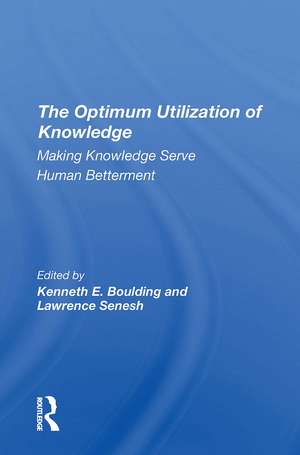The Optimum Utilization Of Knowledge: Making Knowledge Serve Human Betterment
Autor Kenneth E. Boulding, Lawrence Seneshen Limba Engleză Paperback – 31 oct 2024
Preț: 291.83 lei
Nou
Puncte Express: 438
Preț estimativ în valută:
55.84€ • 58.46$ • 46.21£
55.84€ • 58.46$ • 46.21£
Carte tipărită la comandă
Livrare economică 05-19 aprilie
Preluare comenzi: 021 569.72.76
Specificații
ISBN-13: 9780367310011
ISBN-10: 0367310015
Pagini: 398
Dimensiuni: 152 x 229 mm
Greutate: 0.74 kg
Ediția:1
Editura: Taylor & Francis
Colecția Routledge
Locul publicării:Oxford, United Kingdom
ISBN-10: 0367310015
Pagini: 398
Dimensiuni: 152 x 229 mm
Greutate: 0.74 kg
Ediția:1
Editura: Taylor & Francis
Colecția Routledge
Locul publicării:Oxford, United Kingdom
Public țintă
Academic and PostgraduateCuprins
Foreword -- The Optimum Utilization of Knowledge: Some Central Concepts -- What Do We Mean by the Optimum Utilization of Knowledge? -- What Do We Know About Human Learning? -- The Brain, Cognitive Commodities, and the Enfolded Order -- Males and Females and the Learning Process -- Brain Development: Implications for Educational Policy and Practice -- The Impact of Cultural Diversity on the Spread of Knowledge -- The Fear of Knowledge -- How to Apply the Knowledge of Learning -- Formal and Informal Systems of Knowledge -- Concept-Based Learning -- Strategies in Transmitting Knowledge in the School System -- The Laboratory of Archimedes -- Knowledge as a Manageable Resource in Educational Systems -- Fragmentation of Knowledge: An Obstacle to Its Full Utilization -- Closing the Gap Between Frontier Thinking and the Curriculum -- Applying Knowledge to Decision Making -- Closing the Gap Between Expanding Knowledge and Society Through Television in the U.S. -- Mass Media: Knowledge as Entertainment -- Adapting Technology Knowledge to Social Needs -- Accountability in Research: Examples from Agriculture -- The Overutilization of Ignorance of Science and Technology in the Making of Public Policy -- Power Is Knowledge: The Linkages Between the Political System and Knowledge -- Economic Issues in the Utilization of Knowledge -- The Impact of the Arms Race on the Creation and Utilization of Knowledge -- Education for Reflection-in-Action: An Alternative to the Positivist Epistemology of Practice -- The Creation and Utilization of Knowledge in the Business Community -- Optimizing the Uses of Medical Knowledge -- Mediating Structures in the Utilization of Knowledge
Notă biografică
Kenneth E. Boulding is Distinguished Professor Emeritus of Economics at the University of Colorado, Boulder. He is a well-known author and past president of several organizations, including the American Association for the Advancement of Science and the American Economic Association. Lawrence Senesh, Professor Emeritus of Economics at the University of Colorado, Boulder, is copresident and founding member (with Kenneth Boulding) of the Academy of Independent Scholars. He is also one of the founders of the Social Science Education Consortium. The academy was established in 1979 to provide a creative environment for retired scholars and for those whose independent scholarship does not fit the conventional niches of their institutions.
Descriere
We all have more knowledge than we use; even so, say the editors of this book, ignorance often governs our actions. Society continues to find ways to misuse knowledge–from manipulating information to gain political power to restricting what ideas are explored on university campuses.
